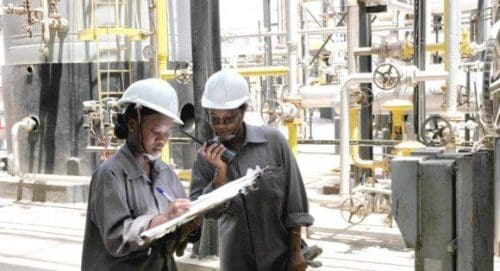
Government plans to restart crude oil refining operations at the Tema Oil Refinery (TOR) by the end of this year as part of efforts to cut the nation’s annual USD 10.2 billion oil import bill and conserve foreign exchange while stabilizing local fuel prices.
The refinery has targeted meeting about 60 percent of local crude oil consumption, which could save the nation an estimated USD 400 million per month in import costs. The facility was originally designed to refine 45,000 barrels per day but can now process up to 60,000 barrels per day following recent upgrades.
Speaking on behalf of Chief of Staff Julius Debrah, Deputy Presidential Spokesperson Shamima Muslim said the move forms part of President John Mahama’s Resetting Ghana Agenda, which seeks to rebuild the economy through reforms and strategic partnerships. She made these remarks at the Africa Best Business Awards held recently.
Ms. Muslim stated that the refinery is set to resume crude oil refining by close of this year, explaining that the move is expected to cut the nation’s USD 10.2 billion annual oil import bill, stabilize oil prices, and conserve foreign exchange. She emphasized that the revival represents a critical step toward achieving energy security and reducing dependence on imported petroleum products, which have been a major pressure point on the cedi and fiscal balance.
The Deputy Presidential Spokesperson said the refinery’s revival follows a comprehensive assessment and restructuring process that reached a 98 percent completion milestone. Under the new model, TOR will operate under a tolling arrangement in partnership with Sentuo Oil Refinery Limited, designed to ensure operational efficiency and financial sustainability.
According to Ms. Muslim, government’s strategy includes upgrading TOR’s distillation units, pipelines, and storage infrastructure to restore its refining capacity. The plan aims to enhance energy security and reduce dependence on imported petroleum products, addressing a major vulnerability in Ghana’s economic structure.
The tolling model fundamentally shifts TOR’s operations from high risk trading to stable service provision. Under this arrangement, a private company sources its own crude, finances the cargo, and bears the full market risk while TOR charges a fixed fee for processing. This transforms TOR’s revenue stream from unpredictable and speculative to guaranteed and sustainable, according to analysis by the Centre for Energy Management and Sustainable Energy.
The organization noted that TOR’s recent performance, including a reported USD 21 million in revenue from terminal operations, proves that the refinery can generate substantial income when its assets are strategically managed. Among successful initiatives has been a take or pay storage agreement with Sentuo Oil Refinery, which guarantees TOR an estimated USD 2 million monthly income, plus new revenue lines from loading rack fees, pipeline right of way charges, and dividends from the Ghana Petroleum Mooring System.
The refinery’s revival is part of a broader set of policy interventions aimed at strengthening the nation’s macroeconomic stability. Inflation has declined to 8 percent while the cedi has gained stability, supported by stronger gold export inflows through the newly established Ghana Gold Board, which has generated over USD 8 billion in foreign exchange earnings.
The Deputy Presidential Spokesperson said the administration’s fiscal and monetary reforms have restored investor confidence and rebuilt discipline in managing the economy. She also cited government’s 24 hour economy initiative and revitalization of the Ghana Free Zones Authority as key growth drivers. The 24 hour economy, backed by a USD 4 billion investment plan and USD 400 million seed fund, aims to create two million jobs, boost industrial output, and support continuous production in ports and manufacturing zones.
In the energy sector, partnerships with private investors have resulted in the commissioning of a 5 megawatt (MW) floating solar photovoltaic plant at Bui, the first of its kind in West Africa, with an additional 25 MW expected next year. These renewable energy investments complement the fossil fuel infrastructure development, creating a balanced energy portfolio.
Ms. Muslim urged the private sector to leverage the enabling environment being created under the Resetting Ghana Agenda. She stated that government is providing the soil, but requires businesses to sow, water, and harvest together with the administration. She added that reviving TOR and investing in renewable energy demonstrate government’s twin goals of achieving energy security and sustainable development while positioning Ghana as an industrial and export hub within the sub region.
TOR has been practically dormant since March 2021, with Ghana currently spending approximately 97 percent of its petroleum product needs on imports. The refinery’s return to operations would mark a significant milestone in reducing this heavy reliance on external sources, which poses economic challenges including high costs and constant drain on foreign currency reserves.
Edmund Kombat, TOR’s Acting Managing Director, revealed in earlier briefings with Parliament’s Energy Committee that Ghana currently spends about USD 400 million per month on fuel imports. He explained that with the refinery running, Ghana would need less than 60 percent of its current import expenditure to meet national fuel demand. Given that national consumption is approximately 100,000 barrels per day, TOR could meet between 45 percent and 60 percent of domestic needs.
